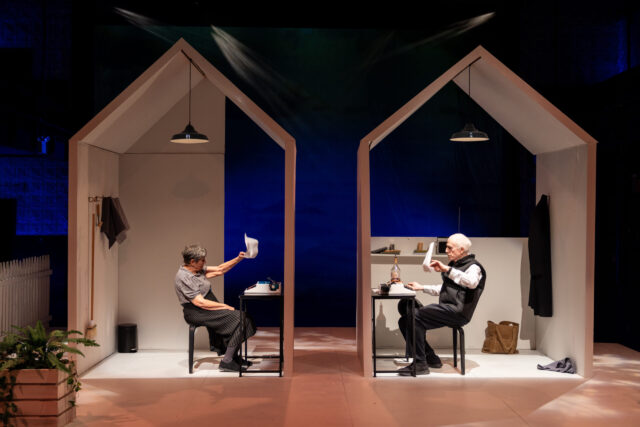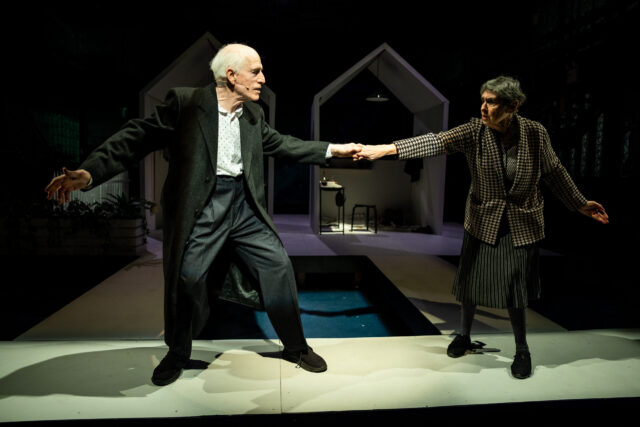
Husband-and-wife Ellen Maddow and Paul Zimet portray a married couple in Existentialism (photo by Maria Baranova)
EXISTENTIALISM
La MaMa Experimental Theatre Club
The Ellen Stewart Theatre
66 East Fourth St. between Second Ave. & Bowery
Wednesday – Sunday through March 10, $35-$40
212-475-7710
www.lamama.org
talkingband.org
Early on in Talking Band’s gorgeously poetic two-character play Existentialism, the man says, “Choice is possible. / What is impossible is not to choose. / If I decide not to choose, / That still constitutes a choice.”
It would be a mistake not to choose to see one of the best shows of the year.
Existentialism is created and directed by former SITI Company head Anne Bogart specifically for Ellen Maddow and Paul Zimet in celebration of the fiftieth anniversary of Talking Band, the troupe Maddow and Zimet cofounded with Tina Shepard in 1974. The duo, who have been married since 1986, portray an unnamed woman and man living in a home on the beach. Anna Kiraly’s set features a pair of house-shaped structures, open in the front, each with the same overhead lamp and a small table with a backless chair and typewriter. Short walkways lead out of and around the rooms, with a small planting bed on the woman’s side. Brian Scott’s lighting casts warm red, yellow, orange, blue, and green glows on the structures, while Darron L West’s sound ranges from loud music to soft nature elements to the actors’ crystal-clear enunciations. Kiraly’s projections of waves on the shore and birds flying freely come and go on a large screen in the back.
The woman waters her plants with panache, raising the watering can high above her as the liquid drips out. She does the shopping and is agonized by a speck of dirt she cannot get clean on the path. The two sit at their respective desks on opposite sides of a wall and type in unison.
He saunters to the front of the stage and speaks directly to the audience: “There is a wall between us, but it is a wall we build together. Each of us puts a stone in the gap left by the other. / I’m going to smile, and my smile will sink down into your pupils, and heaven knows what it will become,” he says, sharing an intimate, funny smile. “I am no longer sure of anything. / Something has to snap. / Words are loaded pistols. / There may be more beautiful times, but this one is ours.” Throughout the show’s seventy minutes, we all fill the gaps with figurative stones (and smiles) of our own.
The dialogue is based on the writings of life partners Simone de Beauvoir and Jean-Paul Sartre in addition to Albert Camus, Martin Heidegger, Maurice Merleau-Ponty, Sarah Bakewell, Maggie Nelson, Octavia Butler, bell hooks, and Betty Friedan. The words form an enticing and gentle meditation on gender and aging, delivered in a soft, plain-spoken, but not dispassionate style. The text is all the more compelling because Maddow is seventy-five and Zimet eighty-one; however, they are imbued with an infectious youthfulness.
“My life is set within a given space of time: / It has a beginning and an end, / It evolves in given places, / Always retaining the same roots, / It spins an unchangeable past, / Its future is limited,” the woman says. “No one else is as old as I am. / How young everyone is!”
The man says, “I was young once.”
The man turns on the radio and listens to Dave Brubeck’s “Broadway Bossa Nova” and Beethoven’s “Moonlight Sonata.” The duo dances to the Jim Carroll Band’s punk anthem “People Who Died” blasting out of the speakers, a furious song about how more than a dozen men and women meet untimely ends. “They were all my friends and they died,” Carroll belts out. A New York City native, Carroll himself died of a heart attack in 2009 at the age of sixty; his most well known works include the novel The Basketball Diaries and the LP Catholic Boy.
Time moves on, but the man and the woman continue their daily existence, discussing life in abstract terms.
“No one will ever make sense of this mystery,” she says.

Paul Zimet and Ellen Maddow take a spin in Existentialism (photo by Maria Baranova)
Last month Maddow and Zimet appeared in The Following Evening at PAC NYC, a show written and directed specifically for them by Abigail Browde and Michael Silverstone of 600 Highwaymen, two married creators in their early forties paying tribute to the older couple and what they have accomplished both personally and professionally.
With Existentialism, Bogart is also celebrating Maddow and Zimet. Bogart last worked with Talking Band in 1988, winning the first of her three Obies for directing No Plays No Poetry but Philosophical Reflections Practical Instructions Provocative Prescriptions Opinions and Pointers from a Noted Critic and Playwright, incorporating the writings of Bertolt Brecht; Maddow and Zimet were part of an ensemble cast that also included Louise Smith and Shepard. Bogart has said that when Maddow and Zimet suggested they work together again, she instantly knew it would be called Existentialism; it’s a fitting title for the show, which has its own built-in meta.
Maddow and Zimet are utterly charming in this new piece, which continues at La MaMa through March 10. Although not much is revealed about their characters, you can’t help but fall in love with their relationship. They know they are in the sunset of their lives, but that isn’t stopping them from enjoying every moment. “Do you think that I count the days? There is only one day left, always starting over. It is given to us at dawn and taken away from us at dusk,” he says.
Bogart captures the essence of long-term love, with all its bumps and bruises. When the woman hides behind the wall, listening intently to the man typing away, you can feel how much they adore and need each other. It’s a tender moment that I won’t soon forget.
But right in front of the houses is a rectangular gap in the walkway, a small but constant threat, reminding us how easy it is to fall off one’s path, something Bogart, Maddow, and Zimet don’t have to worry about with this wonderful collaboration.
“Why do we even exist? Hahaha . . . ,” the woman asks. One reasonable answer could be so we could experience such shows as Existentialism.
[Mark Rifkin is a Brooklyn-born, Manhattan-based writer and editor; you can follow him on Substack here.]